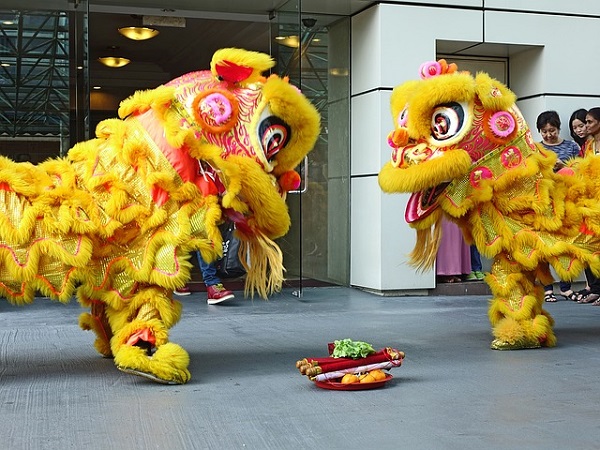
Chinese New Year Cooking & Baking Classes
Happy New Year to all foodie lovers and subscribers with Cooking Class Singapore!
The year of the Dog has just begun and very soon we will be embarking on another big celebration in the region – Chinese New Year.
Chinese New Year is also known as the Lunar New Year or simply “Spring Festival’ in modern China.
This year, the first day of Chinese New Year begins on 16th February and lasts for 15 calendar days till the Lantern Festival on 2nd March.
For those who celebrate Chinese New Year, it’s an opportunity to take a break from work and renew family ties.
The tradition is to hold a lavish feast or reunion dinner to celebrate the lunar new year with auspicious Chinese New Year food.
Lucky Food for Chinese New Year
When it comes to symbolic food and auspicious dishes used in the Chinese New Year reunion dinner, there are many that can be served depending on the specific culture and dialect group of those celebrating.
The common New Year dishes are, to name a few:
- Nian Gao (Year Cake)
- Yu (Raw Fish), Jiao Zi (Dumplings)
- Fatt Choy Ho See (Black Moss with Dried Oysters)
- Chang Shou Main (Longevity Noodles)
- The Phoenix and Dragon (Whole Chicken and Lobster)
- Pencai (Big Bowl Feast)
- Crispy Roasted Pork
- Braised Mushrooms
- Abalone, Prawn
- Drunken Chicken
For the Singapore and Malaysia tradition, the must-have dish is YuSheng Lo Hei (Tossing of Raw Fish Salad) which is served as an appetizer at the beginning of reunion dinner.
The practice of tossing (‘lo hei’) Yusheng (raw fish) means good fortune. Some may use both Yu Sheng and Abalone for the Lo Hei to symbolize double fortune and harvest in the new year.
These dishes symbolize wealth, abundance, health and prosperity. For instance, prawn is pronounced as “ha” in the Cantonese dialect and symbolizes lots of fun.
Why? Because lots of ‘ha, ha, ha’ (laughers) certainly can’t go wrong at your reunion dinner!
Also, abalones, braised mushrooms, braised sea cucumber and black moss are supposed to be inseparable as this dish symbolizes abundance and good fortune based on the way the words of the food sound.
Chinese New Year Cooking Class – Make Your Own Steam Boat Class
Traditionally, auspicious Chinese New Year ingredients are served as dishes for the reunion dinner.
Gradually, more and more families choose to put together their own steamboat.
The Chinese New Year steamboat wouldn’t be complete without essential meat items such as sliced beef, sliced pork, chicken fillets, meatballs, pork wantons and eggs.
For seafood lovers, adding seafood assortments such as sliced fish, crabs, sliced abalone, fish maw, lobsters, cuttlefish, clams, fish balls, prawns and mussels to the steamboat would make it perfect.
Finally, a steamboat will not be complete without the greens.
Leafy vegetables like lettuce, bak choy, tang oh and root vegetables like carrots, yams, lotus roots, white radish, corns and tomatoes are great ingredients to “sweeten” the soup of the steamboat.
And don’t forget to add mushrooms and ta fu (bean curd) as well.
There are companies who offer steamboat package sets and home delivery service.
As the demand for steamboat ingredients are heating up for Chinese New Year steamboat delivery, be sure to order them in advance.
If you want to create your own steamboat menu and put your own steamboat together, we have a hands-on Chinese New Year cooking class that will teach you how to make everything from scratch plus you will learn how to make the soup base, sauces and food items for your steamboat.
See more details below.
- You’ll learn to make your own steamboat from scratch – Preparation of Ingredients.
- You’ll learn to make various types of soup bases – Tomato, Sichuan, Satay, Herbal Chicken.
- You’ll learn to make various types of sauces from fresh ingredients – Sambal Belanchan, Chinese Steam Boat Sauce, Tahi Suki, and Japanese Ponzu.
- You’ll learn to make unique Chinese-style food items – Fish Cakes, Pawn Balls, Beef Balls, and Pork Balls.
Classes start soon so don’t miss the opportunity to enrol!
Chinese Cuisine Cooking Classes – Foundations of Chinese Cuisine & Cooking Technique Classes
To upgrade or polish your culinary skills or even if you are a beginner, you can take up the Chinese Cuisine Foundation Classes and learn to make authentic and auspicious Chinese dishes just right before the Lunar New Year starts.
A number of classes are available in the month of January so do check them out fast before they are fully registered due to their popularity and high demand.
As there are many ways to cook the same ingredients, you will also learn a range of basic cooking techniques and methods traditionally used to make meat, seafood and vegetable dishes as well as Chinese broths in the Foundation Class.
Chinese New Year Bake Festive Classes – Traditional Pastry Class
Now turning to pastries, some of the most popular Chinese New Year pastries are Hup Toh Soh (Walnut cookies), Pineapple tarts, Salted Egg Yolk Cookies, Daisy Cookies, and Almond Sugee Cookies.
Love to indulge in these traditional pastry delights?
Learn to make them yourself.
Enrol in Chinese New Year Bake Festive Classes to learn to make these delicious tarts and pastries. What’s more, the chefs will share their recipes for how to enhance the pineapple jam to your taste.
Baking Classes – Asian Pastry Class, Western Pastry Class
In today’s modern society, you will also see Asian families use Western pastries such as Scones with a variety of flavours and variations as afternoon tea time goodies and gifts for friends and loved ones during the festive season.
So why not create your very own ‘East meet West’ or ‘Fusion’ goodie bags for home visits during Chinese New Year?
Check our baking classes for Asian Pastry and Wester Pasty for classes that are available in January as well as throughout the year.
Usher In Delightful Happy Eaters
Start your Chinese New Year with a ‘bang’ by serving delicious food and ushering in delightful joyful eaters!
Cooking Class Singapore is delighted to bring to you the Chinese New Year Cooking and Baking Classes for 2018.
These Cook Festive and Bake Festive Classes are taught by experienced chefs who will not only teach you how to make authentic Chinese New Year dishes and pastries but also share enhanced recipes and food trends based on years of experience teaching the classes.
The cook-and-bake festive classes are only available once a year and we highly recommend that you register fast before seats are all taken up.
If you are a tourist visiting Singapore and want to enrol in a Cooking Class to learn to make authentic Chinese cuisine and pastries, don’t miss out on this golden opportunity!
Enrol in a Chinese New Year Cooking or Baking Festive Class today.
Enjoy all abundance and prosperity in the New Year and we wish you many happy returns!

2 Responses
Hello cooking class singapore,
This is Wenting, Journalist from Ch8 news. I’m writing with regards to a piece of news I’m planning to run on, which is about cooking classes for CNY dishes. Wondering if your culinary studio do provide classes teaching people to cook CNY dishes. Also, this news angle is zooming into healthier choice for CNY dishes, wondering if you do also have such elements in your classes?
May we link up to discuss further through WhatsApp at 88771327.
I’m looking at running a TV news for coming Wednesday, which we plan to film on Wednesday morning and airing the news in the evening. Perhaps we can chat further?
Hope this message reaches you.
With thanks
Wenting
88771327
Hi Wenting,
We have replied to you via email.
Thank you and have a nice day.
Very best,
Kristi Sheldon